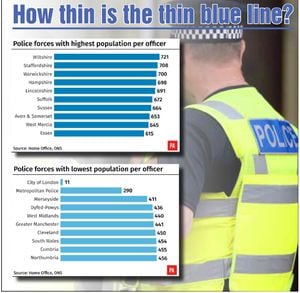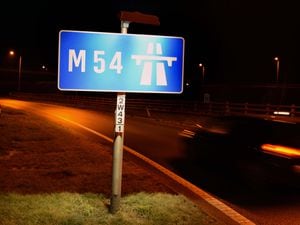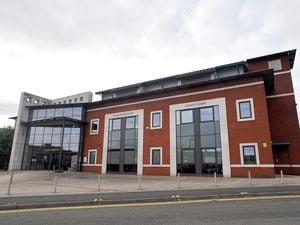Revealed: The thin blue line policing Shropshire's streets
West Mercia Police is in the bottom 10 for the number of police officers it provides to serve its population, new figures have revealed.

The force, which covers Shropshire, has one full time police officer per 645 people, according to figures released today.
But across the border in Dyfed-Powys, each officer serves 436 people. And in London, the Metropolitan Police has a ratio of one officer serving 290 people.
The discrepancies between forces were today attacked by Labour, which claimed communities were being left unprotected because the Government has cut police forces for the last eight years in a row.

Figures collated from Home Office statistics show that, as of May 2018, West Mercia Police employed 1,945 full time officers for an estimated population of 1,272,638.
That places it as the ninth worst in the country for the ratio of police officers to population.
Police in Shropshire say they have made "significant changes" to address staff shortages, including freeing up patrol officers and making it easier for residents to get in touch. West Mercia Police say a recent recruitment drive will see more police in the county.
Its sister force in Warwickshire was the third worst in the country, with only 806 officers for a population of 564,562, or one officer per 700 people.
Read more:
And Staffordshire Police was second to last with one officer per 708 people.
In contrast, Dyfed-Powys Police force was among the five best staffed. The force had 1,186 full time officers in May 2018, serving a population of 516,754.
Community
West Mercia Police announced in September that it was recruiting an additional 100 police officers, taking its total number to more than 2,000.
It has also placed emphasis on community policing, releasing names and mobile numbers of beat officers in Telford in an effort to ensure people feel connected to the force.
Giles York, the National Police Chiefs’ Council lead on workforce, said police forces were providing good services, but that policing was “significantly overstretched”.
And shadow policing minister Louise Haigh claimed communities were being left unprotected because the Government has cut police forces for the last eight years in a row. She said: “With police numbers at record lows it’s little wonder that were seeing violent and sexual crimes soaring year on year whilst conviction rates plummet.
“This is the only Government in modern history that has cut officer numbers every year it has been in office and the crime we are now seeing is on their heads.”
Police under strain warns chief officer
West Midlands Police has one police officer for every 440 people in the region – despite it being the biggest outside London.
West Midlands Chief Constable Dave Thompson spoke out, saying the figures show the challenge facing the region in maintaining effective policing on our streets.
He said: “We have got to provide a service for domestic violence victims, investigate homicides, deal with gangs, deal with gun crime, deal with modern day slavery.
“That list has got bigger over the last few years. At the same time the spread of crime and demand on the service is going up because local authorities and other services have been reduced and so more vulnerable people are coming to the police. We are absolutely at a point where that is not a sustainable position for the police any more.”
Bleak
Despite the bleak new figures, Giles York, the National Police Chiefs’ Council lead on workforce, stressed that a force’s effectiveness cannot be measured on officer numbers alone. “It is the service we deliver that matters to the public,” he said.
“The latest inspection of police forces in England and Wales found that this was good. But it also highlighted that forces have less money than before and are under strain as they deal with rising crime, demand that is more complex and an unprecedented terror threat with fewer officers.
“Some chief constables have already made it clear that police can only prioritise their resources against the greatest harm.”
The Police Federation of England and Wales’ vice-chair Che Donald said officers were having to do “more and more with less and less” due to funding cuts since 2010.
He added: “Forces are facing increasingly limited resources and tough decisions have to be made about what is prioritised. It is unrealistic for the Government to think this is sustainable.”





